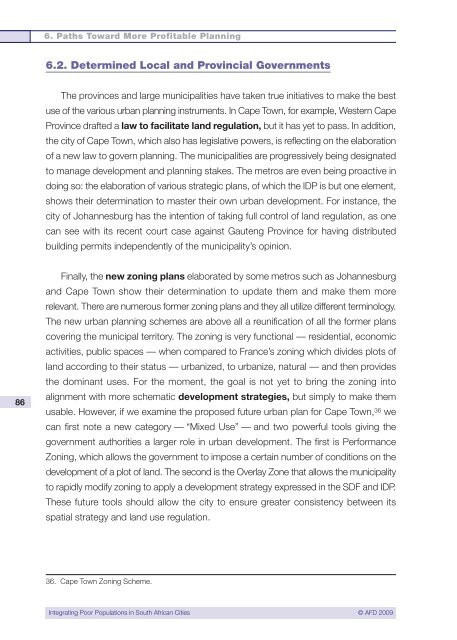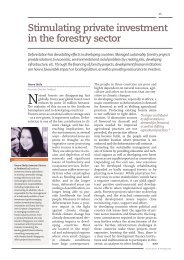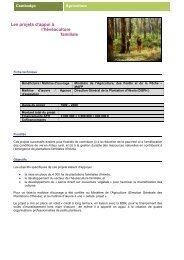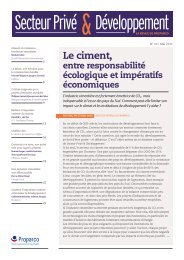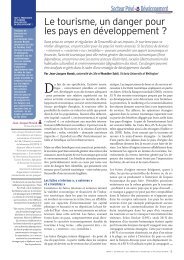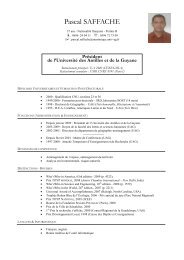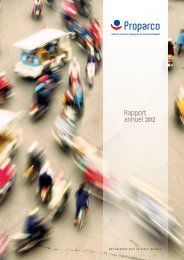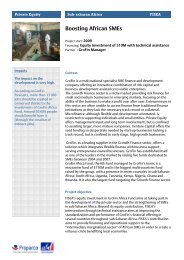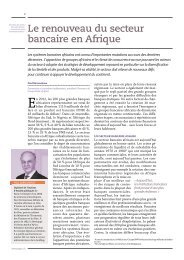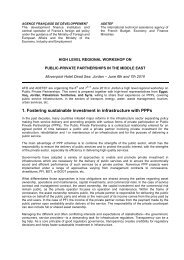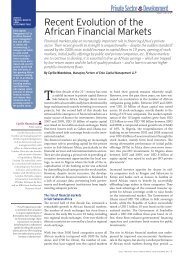Integrating Poor Populations in South African Cities - Agence ...
Integrating Poor Populations in South African Cities - Agence ...
Integrating Poor Populations in South African Cities - Agence ...
Create successful ePaper yourself
Turn your PDF publications into a flip-book with our unique Google optimized e-Paper software.
6. Paths Toward More Profitable Plann<strong>in</strong>g<br />
6.2. Determ<strong>in</strong>ed Local and Prov<strong>in</strong>cial Governments<br />
The prov<strong>in</strong>ces and large municipalities have taken true <strong>in</strong>itiatives to make the best<br />
use of the various urban plann<strong>in</strong>g <strong>in</strong>struments. In Cape Town, for example, Western Cape<br />
Prov<strong>in</strong>ce drafted a law to facilitate land regulation, but it has yet to pass. In addition,<br />
the city of Cape Town, which also has legislative powers, is reflect<strong>in</strong>g on the elaboration<br />
of a new law to govern plann<strong>in</strong>g. The municipalities are progressively be<strong>in</strong>g designated<br />
to manage development and plann<strong>in</strong>g stakes. The metros are even be<strong>in</strong>g proactive <strong>in</strong><br />
do<strong>in</strong>g so: the elaboration of various strategic plans, of which the IDP is but one element,<br />
shows their determ<strong>in</strong>ation to master their own urban development. For <strong>in</strong>stance, the<br />
city of Johannesburg has the <strong>in</strong>tention of tak<strong>in</strong>g full control of land regulation, as one<br />
can see with its recent court case aga<strong>in</strong>st Gauteng Prov<strong>in</strong>ce for hav<strong>in</strong>g distributed<br />
build<strong>in</strong>g permits <strong>in</strong>dependently of the municipality’s op<strong>in</strong>ion.<br />
86<br />
F<strong>in</strong>ally, the new zon<strong>in</strong>g plans elaborated by some metros such as Johannesburg<br />
and Cape Town show their determ<strong>in</strong>ation to update them and make them more<br />
relevant. There are numerous former zon<strong>in</strong>g plans and they all utilize different term<strong>in</strong>ology.<br />
The new urban plann<strong>in</strong>g schemes are above all a reunification of all the former plans<br />
cover<strong>in</strong>g the municipal territory. The zon<strong>in</strong>g is very functional — residential, economic<br />
activities, public spaces — when compared to France’s zon<strong>in</strong>g which divides plots of<br />
land accord<strong>in</strong>g to their status — urbanized, to urbanize, natural — and then provides<br />
the dom<strong>in</strong>ant uses. For the moment, the goal is not yet to br<strong>in</strong>g the zon<strong>in</strong>g <strong>in</strong>to<br />
alignment with more schematic development strategies, but simply to make them<br />
usable. However, if we exam<strong>in</strong>e the proposed future urban plan for Cape Town, 36 we<br />
can first note a new category — “Mixed Use” — and two powerful tools giv<strong>in</strong>g the<br />
government authorities a larger role <strong>in</strong> urban development. The first is Performance<br />
Zon<strong>in</strong>g, which allows the government to impose a certa<strong>in</strong> number of conditions on the<br />
development of a plot of land. The second is the Overlay Zone that allows the municipality<br />
to rapidly modify zon<strong>in</strong>g to apply a development strategy expressed <strong>in</strong> the SDF and IDP.<br />
These future tools should allow the city to ensure greater consistency between its<br />
spatial strategy and land use regulation.<br />
36. Cape Town Zon<strong>in</strong>g Scheme.<br />
<strong>Integrat<strong>in</strong>g</strong> <strong>Poor</strong> <strong>Populations</strong> <strong>in</strong> <strong>South</strong> <strong>African</strong> <strong>Cities</strong> © AFD 2009


